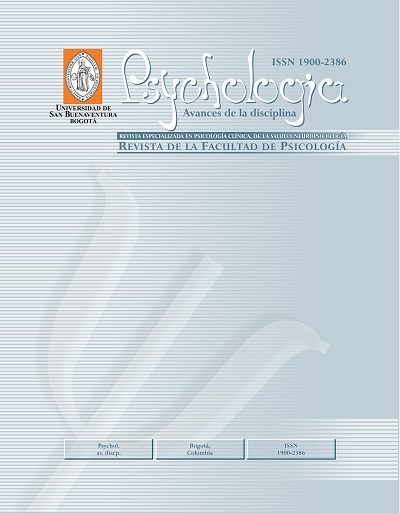View/Download
How to Cite
Roa-Meggo, Y. J. (2017). Relaciones de género y diferencias entre gratitud y personalidad en estudiantes universitarios de Lima-Perú. Psychologia, 11(1), 49–56. https://doi.org/10.21500/19002386.3101
More Citation Formats
License terms
▼
This journal provides open, immediate access to its contents, based on the principle that offering the public free access to research helps to promote a higher global exchange of knowledge.
As such, all journal articles are published under a Creative Commons Attribution-NonCommercial-ShareAlike 4.0 International License (CC BY-NC-SA), by which commercial use of the original work or its possible derived works is not allowed, and the distribution thereof must be done with the same license elements regulating the original work.
http://creativecommons.org/licenses/by-nc-sa/4.0/
Abstract
Este estudio determinó la relación entre la gratitud y la personalidad en estudiantes universitarios de Lima-Perú a través de un diseño descriptivo correlacional. La muestra estuvo conformada por 200 universitarios residentes en Lima, y usando la escala de Gratitud de Alarcón y la escala de Cinco factores de la personalidad de Costa & McCrae, los cuales demostraron altos niveles de fiabilidad y validez, se encontraron relaciones significativas entre la gratitud y los factores de Neuroticismo, Responsabilidad y Amabilidad. También se encontraron diferencias
significativas según sexo.
significativas según sexo.
References
Bartlett, M.Y., & DeSteno, D. (2006). Gratitude and prosocial behavior. Psychological Science, 17, 319–325.
Baumgarten-Tramer, F. (1938). ‘‘Gratefulness’’ in children and young people. The Journal of Genetic Psychology, 53, 53–56.
Bono, G., & Froh, J. (2009). Gratitude in school: Benefits to students and schools. In Gilman, R., Huebner, E.S., & Furlong, M.J. (Eds.), Handbook of positive psychology in the schools (pp. 77-88). New York: Routledge.
Bono, G., & McCullough, M. (2006). Positive respondes to benefit and harm: Bringing forgiveness and gratitude into cognitive psychotherapy. Journal of Cognitive Psychoterapy: An International Quarterly, 20(2), 147-158.
Chen, L., Chen, M., Kee, Y., & Tsai, Y. (2009). Validation of the gratitude questionnaire (GQ) in Taiwanese undergraduate students. Journal of Happiness Studies, 10(6), 655-664.
Costa, P. T., & McCrae, R. R. (1992). Revised NEO Personality Inventory (NEO-PI-R) and NEO Five-Factor Inventory (NEO-FFI) professional manual. Odessa, FL: Psychological Assessment Resources.
Costa, P. T., Jr., & McCrae, R. R. (1985). The NEO Personality Inventory manual. Odessa, FL: Psychological Assessment Resources.
Emmons, R., & McCullough, M. (2003). Counting Blessings versus burdens: An experimental investigation of gratitude and subjective well-being in daily life. Journal of Personality and Social Psychology, 84(2), 377-389.
Emmons, R A., McCullough, M E., & Tsang, J. (2003). The assessment of gratitude. En: Positive psychological assessment: A handbook of models and measures. Lopez, Shane J.; Snyder, C. R.; Washington D.C. US : American Psychological Association, pp. 327-341.
Emmons, R. A., & McCullough , M. E. (Eds.). (2004). The psychology of gratitude. New York: Oxford University Press.
Emmons, R. A. (2012). Queen of the virtues? Gratitude as a human strength. Reflective Practice: Formation and Supervision in Ministry, 32, 50-62.
Fitzgerald, P. (1998). Gratitude and justice. Ethics, 109, 119–153.
Friedman, P., & Toussaint, L. (2006). The relationship between forgiveness, gratitude, distress and well-being: An integrative review of the literature. The International Journal of Healing and Caring, 6(2), 1-10.
Froh, J., Kasdan, T., Ozimkowski, K., & Miller, N. (2009). Who benefits the most from a gratitude intervention in children and adolescents? Examining positive affect as a moderator. Department of Psychology, Hofstra University, Hempstead, New York.
Gordon, A. K., Musher-Eizenman, D. R., Holub, S. C., & Dalrymple, J. (2004). What are children thankful for? An archival analysis of gratitude before and after the attacks of September 11. Journal of Applied Developmental Psychology, 25, 541–533.
Krause, N. (2006). Gratitude toward God, stress, and health in late life. Research on Aging, 28, 163–183.
Lambert, N., Fincham, F., Stillman, T., & Dean, L. (2009). More gratitude, less materialism: The mediating role of life satisfaction. The Journal of Positive Psychology, 4(1), 32-42.
Lazarus, R. S., & Lazarus, B. N. (1994). Passion and reason: Making sense of our emotions. New York: Oxford University Press.
McCrae, R.R., & Allik, J. (Editores) (2002). The Five-Factor Model across cultures. Nueva York: Kluwer Academia-Plenum Publishers.
McCullough, M.E., Emmons, R.A., & Tsang, J. (2002). The grateful disposition: A conceptual and empirical topography. Journal of Personality and Social Psychology, 82, 112–127.
McCullough, M.E., Kilpatrick, S.D., Emmons, R.A., & Larson, D.B. (2001). Is gratitude a moral affect? Psychological Bulletin, 127, 249–266.
Mikulincer, M., & Shaver, P. (Eds.) (2008). Prosocial Motives, Emotions, and Behavior. Washington, DC: American Psychological Association.
Neto, F. (2007). Forgiveness, personality and gratitude. Personality and Individual Differences, 43(8), 2313–2323.
Schwartz, S. H., & Rubel, T. (2005). Sex differences in value priorities: Crosscultural and multimethod studies. Journal of Personality and Social Psychology, 89, 1010–1028.
Sommers, S., & Kosmitzki, C. (1988). Emotion and social context: An American-German comparison. British Journal of Social Psychology, 27, 35–49.
Tsang, J. (2006). Gratitude and prosocial behavior: An experimental test of gratitude. Cognition and Emotion, 20, 138-148.
Ventimiglia, J. C. (1982). Sex roles and chivalry: Some conditions of gratitude to altruism. Sex Roles, 8, 1107–1122.
Wood, A. M., Froh, J. J., & Geraghty, A. W. A. (2010). Gratitude and well-being: A review and theoretical integration. Clinical Psychology Review, 30(7), 890-905. doi: 10.1016/j.cpr.2010.03.005
Wood, A. M., John, M., Raphael, G., Linley, P. A., & Joseph, S. (2008). The role of gratitude in the development of social support, stress, and depression: Two longitudinal studies. Journal of Research in Personality, 42(4), 854–871.
Wood, A. M., Joseph, S., & Maltby, J. (2008). Gratitude uniquely predicts satisfaction with life: Incremental validity above the domains and facets of the five factor model. Personality and Individual Differences, 45(1), 49–54.
Wood, A. M., Maltby, J., Stewart, N., Linley, P. A., & Joseph, S. (2008). A social-cognitive model of trait and state levels of gratitude. Emotion, 8(2), 281–290.
Baumgarten-Tramer, F. (1938). ‘‘Gratefulness’’ in children and young people. The Journal of Genetic Psychology, 53, 53–56.
Bono, G., & Froh, J. (2009). Gratitude in school: Benefits to students and schools. In Gilman, R., Huebner, E.S., & Furlong, M.J. (Eds.), Handbook of positive psychology in the schools (pp. 77-88). New York: Routledge.
Bono, G., & McCullough, M. (2006). Positive respondes to benefit and harm: Bringing forgiveness and gratitude into cognitive psychotherapy. Journal of Cognitive Psychoterapy: An International Quarterly, 20(2), 147-158.
Chen, L., Chen, M., Kee, Y., & Tsai, Y. (2009). Validation of the gratitude questionnaire (GQ) in Taiwanese undergraduate students. Journal of Happiness Studies, 10(6), 655-664.
Costa, P. T., & McCrae, R. R. (1992). Revised NEO Personality Inventory (NEO-PI-R) and NEO Five-Factor Inventory (NEO-FFI) professional manual. Odessa, FL: Psychological Assessment Resources.
Costa, P. T., Jr., & McCrae, R. R. (1985). The NEO Personality Inventory manual. Odessa, FL: Psychological Assessment Resources.
Emmons, R., & McCullough, M. (2003). Counting Blessings versus burdens: An experimental investigation of gratitude and subjective well-being in daily life. Journal of Personality and Social Psychology, 84(2), 377-389.
Emmons, R A., McCullough, M E., & Tsang, J. (2003). The assessment of gratitude. En: Positive psychological assessment: A handbook of models and measures. Lopez, Shane J.; Snyder, C. R.; Washington D.C. US : American Psychological Association, pp. 327-341.
Emmons, R. A., & McCullough , M. E. (Eds.). (2004). The psychology of gratitude. New York: Oxford University Press.
Emmons, R. A. (2012). Queen of the virtues? Gratitude as a human strength. Reflective Practice: Formation and Supervision in Ministry, 32, 50-62.
Fitzgerald, P. (1998). Gratitude and justice. Ethics, 109, 119–153.
Friedman, P., & Toussaint, L. (2006). The relationship between forgiveness, gratitude, distress and well-being: An integrative review of the literature. The International Journal of Healing and Caring, 6(2), 1-10.
Froh, J., Kasdan, T., Ozimkowski, K., & Miller, N. (2009). Who benefits the most from a gratitude intervention in children and adolescents? Examining positive affect as a moderator. Department of Psychology, Hofstra University, Hempstead, New York.
Gordon, A. K., Musher-Eizenman, D. R., Holub, S. C., & Dalrymple, J. (2004). What are children thankful for? An archival analysis of gratitude before and after the attacks of September 11. Journal of Applied Developmental Psychology, 25, 541–533.
Krause, N. (2006). Gratitude toward God, stress, and health in late life. Research on Aging, 28, 163–183.
Lambert, N., Fincham, F., Stillman, T., & Dean, L. (2009). More gratitude, less materialism: The mediating role of life satisfaction. The Journal of Positive Psychology, 4(1), 32-42.
Lazarus, R. S., & Lazarus, B. N. (1994). Passion and reason: Making sense of our emotions. New York: Oxford University Press.
McCrae, R.R., & Allik, J. (Editores) (2002). The Five-Factor Model across cultures. Nueva York: Kluwer Academia-Plenum Publishers.
McCullough, M.E., Emmons, R.A., & Tsang, J. (2002). The grateful disposition: A conceptual and empirical topography. Journal of Personality and Social Psychology, 82, 112–127.
McCullough, M.E., Kilpatrick, S.D., Emmons, R.A., & Larson, D.B. (2001). Is gratitude a moral affect? Psychological Bulletin, 127, 249–266.
Mikulincer, M., & Shaver, P. (Eds.) (2008). Prosocial Motives, Emotions, and Behavior. Washington, DC: American Psychological Association.
Neto, F. (2007). Forgiveness, personality and gratitude. Personality and Individual Differences, 43(8), 2313–2323.
Schwartz, S. H., & Rubel, T. (2005). Sex differences in value priorities: Crosscultural and multimethod studies. Journal of Personality and Social Psychology, 89, 1010–1028.
Sommers, S., & Kosmitzki, C. (1988). Emotion and social context: An American-German comparison. British Journal of Social Psychology, 27, 35–49.
Tsang, J. (2006). Gratitude and prosocial behavior: An experimental test of gratitude. Cognition and Emotion, 20, 138-148.
Ventimiglia, J. C. (1982). Sex roles and chivalry: Some conditions of gratitude to altruism. Sex Roles, 8, 1107–1122.
Wood, A. M., Froh, J. J., & Geraghty, A. W. A. (2010). Gratitude and well-being: A review and theoretical integration. Clinical Psychology Review, 30(7), 890-905. doi: 10.1016/j.cpr.2010.03.005
Wood, A. M., John, M., Raphael, G., Linley, P. A., & Joseph, S. (2008). The role of gratitude in the development of social support, stress, and depression: Two longitudinal studies. Journal of Research in Personality, 42(4), 854–871.
Wood, A. M., Joseph, S., & Maltby, J. (2008). Gratitude uniquely predicts satisfaction with life: Incremental validity above the domains and facets of the five factor model. Personality and Individual Differences, 45(1), 49–54.
Wood, A. M., Maltby, J., Stewart, N., Linley, P. A., & Joseph, S. (2008). A social-cognitive model of trait and state levels of gratitude. Emotion, 8(2), 281–290.
Downloads
Download data is not yet available.





















